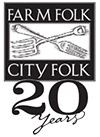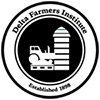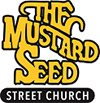2016 enviroFund™ grant recipients
Focus for 2016
In 2016, the enviroFund continued to provide support towards the development of a sustainable, local food system. For Vancity, a strong sustainable food system is one in which sustainable food production, processing, distribution and consumption are integrated to enhance the economic, environmental and social health of our operating regions of Metro Vancouver, Greater Victoria and the Fraser Valley.
In 2016, the enviroFund allocated $1,008,000 in funding to support three program areas:
1. Targeted Sector Support
Vancity is committed to helping local and organic food businesses grow.


In 2016, the enviroFund invested in the future by supporting the development of a new Centre for Sustainable Food Systems at UBC Farm. In a two year agreement Vancity has agreed to support the CFSF with a $500,000 grant, ($250,000 of which will be allocated in 2016). The Centre for Sustainable Food Systems (CSFS) acts as a catalyst in the Lower Mainland and BC for economic, social, and environmental activity and innovation in the food system. The CSFS aims to pioneer more sustainable local and global food systems by providing information, research, and training, and by collaborating with a broad spectrum of business and non-profit partners.
$400,000 will support the new building which will house a pilot processing plant. BC is the only province without a pilot processing plant, so this addition is integral to growing our local food processing business sector. This plant will allow early stage food entrepreneurs a chance to test their products and the market without having to make big investments in infrastructure.
$100,000 will support programing at the CFSF that will help build the business capacity of progressive BC food producers and processors for a five year period from 2017 – 2021. This year the support is going towards the Feeding Growth – Scale Your Progressive Food Business series.
2. Sustainable Food System Development Initiatives
This program is aimed at providing support for organizations which are focused on developing a viable and sustainable local food system through sector development initiatives. We are interested in supporting organizations that are working to build a food system which contributes to a healthier environment, improved individual health, and a more resilient local economy. These organizations will receive both project and core organizational support.

Young Agrarians
Young Agrarians Organizational Development and Business Mentorship Network ($40,000)
Young Agrarians is a network supporting and encouraging new and young ecological and organic farmers in BC. They received core organizational funding and support for their Business Mentorship program. The program funding will help new farmers develop the business skills necessary to run financially viable farm businesses.

BC Food Systems Network
Finding Common Ground through Collective Impact ($40,000)
The BC Food Systems Network operates as a network to build connections, catalyze opportunities, and coordinate activities to advance the mission of creating healthy, just and sustainable food systems in British Columbia. The ‘Finding Common Ground through Collective Impact’ project is focused on advancing innovative public policy, programs and partnerships to better coordinate training and support for new entrants into farming. Education, training and extension opportunities that support new entrants will be crucial in developing new local farmers and protecting our local food supply.

The Capital Region Food and Agriculture Initiatives Roundtable (CR-FAIR)
Land Access and New Grower Development ($40,000)
CR-FAIR is a coalition of organizations, working in the Capital Regional District, to strengthen regional food security and our local food system, from farm gate to dinner plate. Funding through the enviroFund will support a variety of sector building initiatives in two main areas:
- Supporting land access and new grower development through the establishment of two new incubator farms in conjunction with two municipal partners.
- Building regional marketing and distribution capacity through support for 3 key initiatives: Get Ready Get Local, Flavour Trails, and Farmer2Farmer.

FarmFolk/CityFolk (FFCF)
Resources for Local Food Business Development ($40,000)
FFCF works to cultivate a local, sustainable food system. Their projects provide access to and protection of foodlands; support local growers and producers; and engage communities in the celebration of local food. Program funding will support local farmers and food businesses through their Get Local Program. In order to make finding and buying local products more convenient than ever before, they will connect consumers with local food producers (stores, restaurants, and markets) through their Get Local site powered by Soil Mate.

Vancouver Farmers Market
Riley Park Pavilion Permanent Farmers Market: Phase II ($40,000)
Vancouver Farmers Market have been supporting small farm production, nourishing people and connecting neighbours for over 20 years, through their many farmers’ market locations. They serve 20,000 people weekly, generating $15 million in direct and indirect revenues for the regional economy, yet this economic and social impact is based on markets that are outdoors in temporary locations with no long-term permits and no infrastructure. This project funding will help them raise the capital necessary to secure a permanent year-round farmers market space at the planned Riley Park Pavilion. Ultimately, the intended impact is to build Vancouver's first dedicated, purpose-built farmers market pavilion and plaza: a precedent and model for other future similar structures in Vancouver - a permanent legacy for future generations of farmers and community members and our regional food system overall.

Vancouver Aquarium
Ocean Wise Program ($40,000)
This program funding will support the Ocean Wise Local Food program, which aims to reduce economic, geographic and cultural barriers to consumers who want to purchase sustainable seafood. Funding will also support local businesses incorporate more sustainable seafood options into their businesses, through industry outreach events and training. This year, they are excited to welcome sustainable seafood ambassador and celebrated Chef Ned Bell as the Vancouver Aquarium’s Ocean Wise Executive Chef. Chef Bell will participate in industry outreach events and help offer peer-to-peer guidance to new Ocean Wise chefs and businesses.

Vancouver Urban Farming Society, (VUFS)
Growing a Thriving Urban Farming Sector in Metro Vancouver ($38,000)
VUFS is receiving core funding to help them improve organizational operations and build financial sustainability for the organization. The program funding will support a variety of initiatives that help the development of urban farming, including: tool sharing program, farm intern enrichment programs, urban farmer workshops, urban farm tours, and the annual Vancouver Urban Farming Forum.

BC Association of Farmers’ Markets
Farmers' Markets: Building Capacity of BC Farmers' Markets and Food Producers ($40 000)
The BCAFM is committed to developing and strengthening the capacity of farmers' markets in all regions of British Columbia. They educate, engage and inspire people to create a vibrant farming sector in BC, one that nourishes and supports our natural environment and communities. The project funding for BCAFM will support their business development training programs for farmers’ market vendors - the small businesses, including small-scale farmers, food processors and other locally focused food businesses that are the foundation of farmers' markets across the province.

Kwantlen Polytechnic University Foundation
First Nations and Local, Community Based Food Systems ($40,000)
The wellbeing of Indigenous Peoples is closely linked to their ecosystems and the complexities of their social and economic circumstances. Decades of discrimination and marginalization has resulted in limited access to the resources that impact their ways of traditional and local agriculture, creating systemic issues such as high rates of chronic disease and obesity, food insecurity and unemployment. This project aims to address these issues and elucidate the opportunities for involvement of southwest BC First Nations in the local food movement in ways that are culturally appropriate.
3. Local Food Project Grants:
This program supports larger-scale projects that are innovative or scalable, will increase local sustainable food production and lead to the growth of this sector.

Asian Environmental Association (HUA Foundation)
Bridging Vancouver’s Parallel Food Systems ($40,000)
The initiative will build off of previous successes and lessons learned from HUA Foundation's food security initiative, the Choi Project. The goal is to increase the local Chinese restaurant industry’s procurement and use of seasonal, local and sustainable food. The organization will work directly with the local Chinese food system, producers, vendors and supplier networks to develop alternative local models for distribution, such as through farmers’ markets and direct sales mechanisms. A model of intercultural food security engagement will be developed and shared with neighbourhood-based organizations.

City of Surrey (Economic Development Division)
The Surrey 2nd Phase Land Linking and Training Incubator Project ($20,000)
The project is aimed at unlocking prime underutilized ALR land and increasing local food production in the Fraser Valley. It will provide easy to understand actionable farm-start information for new farmers looking to lease land and start careers in agriculture. The project builds on the impact of the farmableNOW website and the development of a Fraser Valley land matching program which connects aspiring farmers with the region’s farmland owners.

Creating Homefulness Society (Woodwynn Farms)
Homeless Feeding Ourselves ($40,000)
The initiative will increase local food production on Vancouver Island by transitioning 106 acres of land used for hay production at Woodwynn Farms into bio-diverse organic crops. As the food production on this farm increases, participants from the therapeutic community program will learn about farming, permaculture and give back to the broader community while working through their recovery program.

Delta Farmers’ Institute Society
Fraser River Salinity Monitoring ($40,000)
The purpose of this project is to better understand the impacts related to climate change on the Fraser River hydrology and salinity levels. The project includes a computerized salinity model study and in-river salinity monitoring. The aim is to improve the operation of fresh water irrigation intakes for agriculture along the Lower Fraser River with secondary benefits to wildlife, fisheries and the health of the Fraser River estuary.

DRS Earthwise Society
Earthwise Farm Agassiz Phase 1 ($30,000)
The project extends Earthwise Society’s established community farming and education programs to serve a new market by bringing two acres into cultivation as a certified organic demonstration teaching farm in Agassiz. The farm will raise awareness of sustainable growing practices and integrate habitat enhancement for salmon and other critical species in a farming environment. Plans include agri-tourism initiatives through farm gate sales and the Agassiz Circle Farm Tour, and employment and educational opportunities for local youth.

FarmFolk CityFolk
BC Seed Extension Services ($40,000)
FarmFolk CityFolk will create a formal seed extension service in BC – a program that will support farmers and help grow the seed industry. The project builds on their decade-long work with seed growers in the province and will focus on market research and development; advanced training for seed growers; mentorship for new seed growers; commercial-scale seed production; and increasing collaboration.

Fernwood Neighbourhood Resource Group (Fernwood NRG)
Fernwood Helping Hands: Food Rescue and Gleaning Project ($39,500)
This project aims to increase the regional capacity for food waste recovery by creating a permanent, constant, real-time rescue system that flows systemic, seasonal food surpluses into social enterprises and other food security initiatives of Fernwood NRG.

Fraser Common Farm Co-op
Adapting to a Changing Climate ($40,000)
Using permaculture principles and practices, Fraser Common Farm Co-op will design and implement a plan to manage water and wooded areas with a focus on food and nut producing perennials. The aim is to increase long-term food production and share processes and resources with other farms and agricultural networks.

Glen Valley Organic Farm Cooperative
Food Processing Kitchen ($40,000)
The organization will install a black water sewage system in order to complete the functionality and licensing of an on-site kitchen to enable the processing of organic food produced on the farm. It will allow the farm to conduct food processing workshops and offer commercial kitchen space to other local farms. The project will help to increase the capacity of farmers’ to preserve products and increase revenues through value-added product lines.

Meal Exchange
Real Food Challenge British Columbia Phase 2 ($20,000)
The Meal Exchange will bring The Real Food Challenge to colleges and universities in B.C. The goal is to leverage campuses’ purchasing power to develop the market for sustainable agriculture in B.C. The goal is to pilot at 3 campuses.

Salmon Coast Field Station Society
Building Local Ecological Monitoring Capacity ($10,500)
The project will enhance and amplify Salmon Coast Field Station Society’s long-term sea-lice monitoring program. It will empower and train local First Nation communities to monitor ecological conditions and explore the impacts of fish farms on wild salmon populations. Data will be compiled, analyzed and shared widely in order to inform strategy and policy.

The Mustard Seed Street Church
Food Rescue Project Processing Kitchen ($40,000)
The organization addresses food insecurity through the operation of a food rescue program, where excess perishable food from local farms and grocery stores is gleaned, sorted and distributed through not-for-profit agencies. A shared-use food processing kitchen will be added to the food rescue storage warehouse. The processing kitchen expansion will increase the capacity of the Food Security Hub and provide opportunity to create locally grown, sourced and value-added products. The project also includes employment and skills training, as well as, rented space for businesses and not-for-profits.